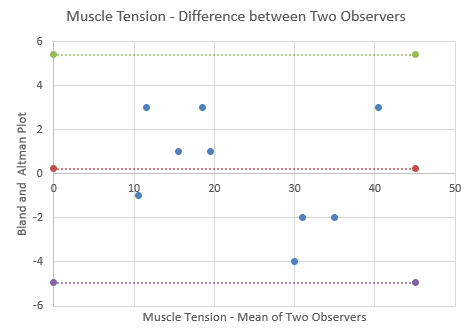Session Information
Session Type: Poster Session (Sunday)
Session Time: 9:00AM-11:00AM
Background/Purpose: Muscle pressure is increased in fibromyalgia as measured by a pressure gauge with a needle inserted into the trapezius muscle. We attempted to evaluate whether different examiners found the same muscle pressure using the recommended technique.
Methods: Two nurses and two physicians separately determined the muscle pressure on fibromyalgia patients who met the ACR criteria for the diagnosis. A needle was inserted at a 45 degree angle up to ½ inch into the left trapezius muscle, 0.3 cc of saline was injected, and the pressure was determined using a manometer. A paired t-test and a Bland-Altman analysis were used to assess the agreement between the two professionals’ muscle pressure measurements.
Results: Nine fibromyalgia patients had two muscle pressure evaluations performed by different professionals. Two rheumatology nurses, one rheumatologist and one rheumatology fellow performed the examinations. Visual analog scales were determined based on patient evaluation, and the muscle pressure was measured in mmHg. The mean (SD) of the differences between the pairs of professionals’ scores was 0.2 (2.59), and this difference was determined to be insignificant (p = 0.803). Per the Bland-Altman analysis, the 95% limits of agreement are -4.9525 to 5.3970, and all the pair differences fell within these limits, indicating a high level of agreement between the data obtained by the nurses and physicians in determining the muscle pressure in fibromyalgia patients.
Conclusion: This study demonstrates that there is strong agreement – or reproducibility – between the muscle pressures measured by trained rheumatology professionals. Therefore, the measurement of muscle pressure is a reliable indicator of muscle tension in fibromyalgia patients and is a technique that is relatively easy to teach.
To cite this abstract in AMA style:
Katz Small A, Small B, Polyak Wokurka J, Katz R. Determination of Muscle Pressure in Patients with Fibromyalgia by Two Examiners; The Examiners Get Similar Results [abstract]. Arthritis Rheumatol. 2019; 71 (suppl 10). https://acrabstracts.org/abstract/determination-of-muscle-pressure-in-patients-with-fibromyalgia-by-two-examiners-the-examiners-get-similar-results/. Accessed .« Back to 2019 ACR/ARP Annual Meeting
ACR Meeting Abstracts - https://acrabstracts.org/abstract/determination-of-muscle-pressure-in-patients-with-fibromyalgia-by-two-examiners-the-examiners-get-similar-results/


